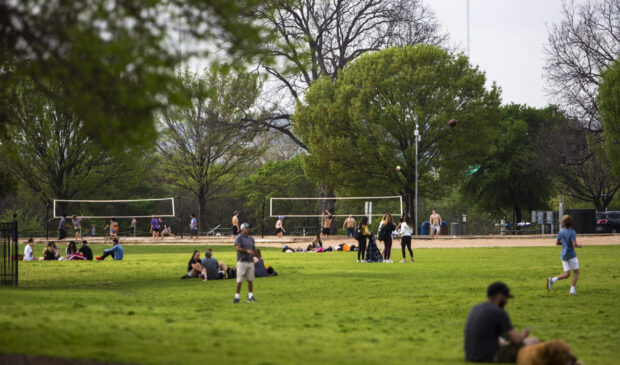But during peak times of the year, accessing the park can be a challenge. The parking lots fill up quickly, and traffic backs up Barton Springs Road. Other options are also limited: Bike racks are often filled, and taking a bus can be long and complicated.
The city has tried to address the accessibility issues by offering a free shuttle service during certain events. Expansion of the service has been widely supported but is only one part of the solution, city leaders said.
In November 2020, the city began developing a plan that would address some of the park’s growing pains and environmental needs.
That plan was released in November after years of public input and engagement. And in May, the city’s Parks and Recreation Board gave the plan the green light, moving it to Council for a vote. The proposal included building three parking garages, several new pedestrian and bicycle bridges, a welcome center and a natural pedestrian and bike bridge over Barton Springs Road.
It also called for the Hillside Theatre to be relocated to the Great Lawn – the big grassy area that overlooks downtown Austin – allowing it to accommodate up to 5,000 people. More than 90 acres of green space were expected to be gained as part of the plan.
But the plan prompted a huge outcry from some in the community – mostly Zilker neighborhood residents and Save Our Springs Alliance members. Many said it would change the look and feel of the beloved park.
More than 200 people filed into a Parks and Recreation Board meeting in May to oppose the plan, particularly the parking garages (which would not add any additional parking but would centralize parking areas) and the theater’s relocation. Several residents also accused the city of selling the park to entertainment giant Live Nation.
People sang and chanted from the podium for hours. The meeting had to be extended a few times.
Kimberly McNeeley, director for the Parks and Recreation Department, said at the meeting that as the park’s popularity continues to grow, so does the need to accommodate visitors there.
“We have spent over two years trying to capture all the things that Austin wants to see at Zilker,” she said. “Not everyone agrees, but I assure you the team tried to take the best of everything and make it into something that you could consider with confidence.”
Council was expected to vote on the plan later this month, but the vote has been postponed indefinitely.
In June, Watson said he did not support portions of the proposed plan, including the parking garages and the theater’s relocation.
“My recommendation is that we cool off for a spell,” Watson wrote in a newsletter Monday. “We could all benefit from a little time and perspective. And then, we can start working together on the recommendations in the plan that have consensus.”
Alter said that while a pause does put the city behind in addressing the issues that are most needed – erosion and accessibility – it ensures the city finds a way to move forward together. Taking time now to get it right is critical, he said.
“I think we can’t afford to go forward with this plan,” Alter said. “That would be more harmful than waiting to address some of these current challenges. … We would’ve just rehashed this divide (as time went on) and that is not healthy for anybody. What we need to do is have a moment to breathe and figure out where we all can agree and start moving forward on that.”
It’s unclear how long Council will wait before considering the plan again, but Council members confirmed to KUT on Monday that it would not be anytime soon.
A statement from the parks department said the pause was disappointing, but that the city would find a way forward together.
“We appreciate the community feedback we received over the years,” the statement read, “and hope together we can determine a path forward that preserves and protects Zilker Park, ensures equitable access for all who visit, and is embraced by our broader community.”









